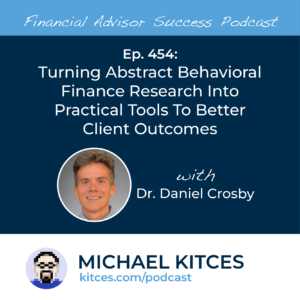Enjoy the current installment of "Weekend Reading For Financial Planners" – this week's edition kicks off with the news that a recent pair of surveys finds a potential disconnect between financial advisors and wealthy clients, with client perceptions lagging advisors' confidence in the level of service they provide across several areas (from retirement and tax planning to responsiveness to client inquiries) and only 57% of clients indicating they would recommend their advisor and/or firm to others. Which suggests that while industry client retention levels remain high, surveying their own client base could give advisors a picture into areas where clients are seeking higher-level service (and perhaps offering an opportunity to show the "invisible work" they're doing on the clients' behalf) and to identify clients who are most enthusiastic about the firm (and could be more likely to make referrals going forward).
Also in industry news this week:
- The SEC has fined Vanguard $19.5 million in part for inaccurate marketing materials related to the compensation of advisors working in its Personal Advisor Services program, demonstrating the need for clarity for firms when discussing fee models and advisor incentive compensation structures
- Inflation remains the top concern amongst retirement savers, according to a recent survey, potentially opening the door for advisor discussions on how inflation could impact clients' financial plans and potential ways to mitigate it
From there, we have several articles on retirement planning:
- The long-run benefits of delaying Social Security benefits and how advisors can address potential concerns hesitant clients might raise
- Why a subset of financial advisory clients might consider claiming Social Security benefits early, from a current need for additional income to a compelling health reason
- How a Social Security "bridge" strategy can provide clients with greater income throughout their retirements
We also have a number of articles on tax planning:
- How the One Big Beautiful Bill Act (OBBBA) could increase the value of Qualified Charitable Distributions (QCDs) by helping clients keep their income below key phase-out thresholds for certain tax deductions
- QCDs will be easier to report in 2025 thanks to a change to Form 1099-R, though clients and their advisors will still be on the hook for ensuring that a particular distribution qualifies for QCD status
- How financial advisors can help charitably minded clients weigh the relative tax benefits between making QCDs or donating appreciated securities
We wrap up with three final articles, all about attention:
- The many benefits of boredom, including the ability to consider big-picture issues in the absence of constant busyness
- Why differentiating between "additive" and "extractive" can help an individual get the most out of technology while avoiding its potential downsides
- Why true multitasking is nearly impossible for most individuals and how certain work practices can help an individual efficiently knock items off their to-do list while focusing on one task at a time
Enjoy the 'light' reading!




